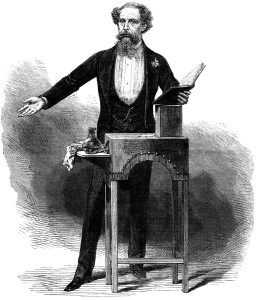
Saturday 8 October 2016, Senate House, London
Dickens Day turns 30 in 2016, so, in a mood both retrospective and celebratory, we will be thinking about time, memory, narrative and biography in Dickens’s work, the multiple, complex and sometimes contradictory ways he narrates, commemorates and celebrates time’s passing, and the different ways in which Dickens, in his turn, has been commemorated and celebrated. Dickens’s novels are famous for their depictions of what he regarded as the universal milestones of life – birth, courtship, marriage, childrearing, death – but his novels also teem with alternative life stories and unconventional modes of living and relating. Dickens was famously convivial – anniversaries, celebrations and parties of all kinds can be found in his work – but his fiction also abounds with a melancholy sense of life’s impermanence, heavily inflected by his Christian belief in a consolatory salvation. Furthermore, Dickens often uses humour and satire to mock solemnity, deflate pretention and undermine formal and informal celebrations and milestones – witness Pip’s miserable Christmas in Great Expectations or the dreadful parties thrown by the Podsnaps in Our Mutual Friend.
Autobiography and biography are also famously prominent in Dickens’s fiction and non-fiction and he continually reworked and reimagined his own life story via his writing. Dickens was also fascinated by the transformative moments or decisions on which a life might turn, observing in Great Expectations, the ‘long chain of iron or gold, of thorns or flowers, that would never have bound you, but for the formation on the first link on one memorable day.’ Relatedly, his work abounds with humorous, surreal and mournful counter-factuals that consider how a life might have otherwise turned out.
How is the passing of time observed in Dickens’s work? Is there a distinctively ‘Dickensian’ understanding of time? How does Dickens both proffer and undermine normative life narratives? What is the function of the celebratory moment in Dickens? How did Dickens use biography and autobiography to refract his own life story and life choices? How did Dickens understand memory, both scientifically and aesthetically? How do we celebrate and commemorate Dickens now? These are just a few of the questions we hope to consider on the day.
The organisers warmly invite proposals for 20-minute papers from scholars of all backgrounds and career stages. They are always keen to feature new work from postgrads, postdocs, early career teachers and researchers, and those working outside the academy.
Themes include, but are not restricted to:
Please send proposals (maximum 500 words) to bethan.carney@gmail.com, furneauxh@cardiff.ac.uk and benwinyard@hotmail.com. The deadline for paper proposals is 31st May 2016.